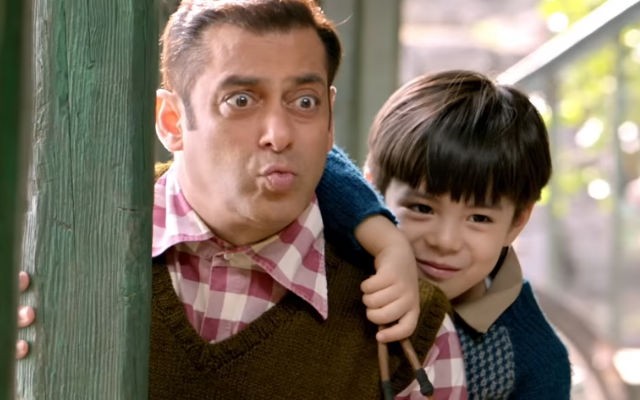First things first, it’s great to see Om Puri one last time. Puri was one of the very finest actors our country ever produced, and Kabir Khan’s Tubelight marks his last filmed performance. Sure, he looks like he’s walked straight off the logo for Kentucky Fried Chicken, and is given trite platitudes to mouth instead of actual dialogue, but it’s still wonderful to watch him chew on watermelon and tell us how faith can move mountains. In fact, say I, we should all be grateful to Khan and Tubelight for illustrating to us just how true it is that dear Mr Puri is, indeed, now in a better place.
In Hindi movies, every Khan has his day. Kabir’s came two years ago with the emotionally impactful and highly effective Bajrangi Bhaijaan, which I enjoyed thoroughly. This time, it’s Sohail Khan’s turn, and he gets to outshine his celebrated brother simply by keeping a straight face. Tubelight is a Salman Khan film that kept me longing to have Sohail back on screen, and those are words I’d never thought I’d type.
As with war, any escape is valid, you see. Tubelight is a remake of a 2015 American release called Little Boy, a film which sounds obnoxiously manipulative to begin with, and – going by synopses – the Hindi rendition seems slavishly faithful. Well, as faithful as it can be considering it stars a man 40 years too old to play the lead.
Little Boy is about an eight year old child coming to grips with the futility of war, indulged by townsfolk to believe in his own magic. A child who lives on mollycoddling and affirmation? It’s not hard to see why Kabir would cast this particular actor, though it is intensely problematic that the Salman Khan public relations initiative is plumbing such shameless depths. The message being sent out with this film is: poor little superstar who doesn’t know better.
There might be something to that. Salman hasn’t had to actually act for a while now, though he has been making more of an effort in Kabir’s films. With this one, alas, he goes “full retard” as Robert Downey Jr dismissively scoffed in Tropic Thunder. While Khan could hardly be expected to pull off a Forrest Gump, what we get here is even worse than Koi Mil Gaya: Tubelight is the story of a developmentally disabled man whose superpower is making constipated sounds.
Set in September 1962, the film is about Laxman Singh Bisht (Salman) whose brother Bharat (Sohail) has gone across the border to fight in the Indo-Chinese war. Here, period authenticity and detailing basically equals to everyone wearing sweater-vests. The film is set in a small, fictional hamlet, where Laxman is loved and laughed at in equal measure, until one day a travelling magician (who also appears to moonlight as a motivational speaker) uses him in a trick and shows him he can move a bottle with his mind.
This leads to Salman trying to move mountains and stop wars by sticking his arms out and grunting earnestly, over and over. These are supposed to be emotionally hardcore scenes depicting naive wholesomeness and a good heart. They come across unbearably farcical, crippled by what is possibly the worst performance of Salman’s chequered career. Tubelight means well, an anti-war movie that illustrates the pointlessness of battle and the importance of not actively hating those you are at war with, and while its simplistic message is timely and admirable, the film is rendered unwatchable because of the leading man.Kabir has always been good with war sequences, but while the ones in this film are mounted on an impressive scale and efficiently shot, the choreography is baffling. A row of soldiers stands in position, and when enemies open fire, they all fall to the ground, shot in the right shoulder at the exact same time.
Everyone besides Salman is good here, which is again a new thing to write about a star whose screen-presence and spontaneous charisma has carried him through many a horrid film. We get fine performances from bright Chinese actress Zhu Zhu and, most memorably, moon-faced child Matin Rey Tangu, who should have swiftly replaced the lead. These two play Indians of Chinese origin, facing hostility and prejudice during the Sino-Indian conflict, and it must be emphasised how unforgivable it is to cast a Chinese actress alongside a kid from Arunachal Pradesh here, as if to say it’s all the same.
Alongside the Khan brothers who look to have been inflated with tyre-pumps, there is a strong cast, the norm at a time Indian casting directors have come good. We have the infallible Brijendra Kala smiling, possibly at the thought of his cheque, while Yashpal Sharma hams uncharacteristically hard, chewing on and repeating each line a couple of times as if to make it more palatable. Meanwhile, supporters of arthouse cinema may find it therapeutic to watch a strong thespian like Mohammad Zeeshan Ayyub wallop the megastar a few times.
Zeeshan, in fact, is particularly good as a knock-kneed meanie, but there’s only that much he is allowed to do, as this film – and everyone in it – constantly makes way. It’s the Salman Khan show, and here he is bobbing his head and widening his eyes, with all the expressiveness of a hurriedly drawn thumb-puppet.
Faith may indeed move mountains. It’s a taller ask to make the mountain act.


Leave a Reply